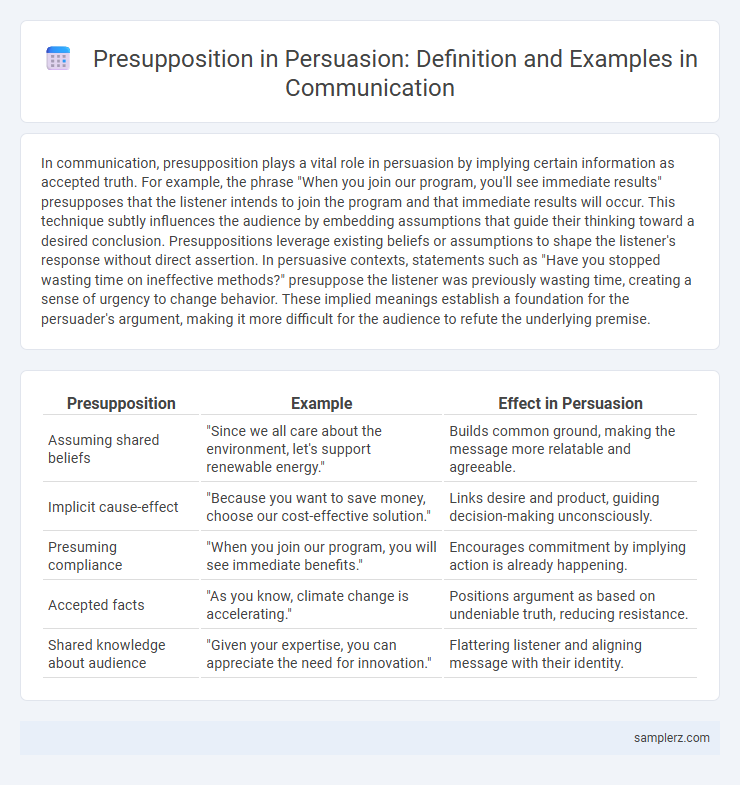In communication, presupposition plays a vital role in persuasion by implying certain information as accepted truth. For example, the phrase "When you join our program, you'll see immediate results" presupposes that the listener intends to join the program and that immediate results will occur. This technique subtly influences the audience by embedding assumptions that guide their thinking toward a desired conclusion. Presuppositions leverage existing beliefs or assumptions to shape the listener's response without direct assertion. In persuasive contexts, statements such as "Have you stopped wasting time on ineffective methods?" presuppose the listener was previously wasting time, creating a sense of urgency to change behavior. These implied meanings establish a foundation for the persuader's argument, making it more difficult for the audience to refute the underlying premise.
Table of Comparison
| Presupposition | Example | Effect in Persuasion |
|---|---|---|
| Assuming shared beliefs | "Since we all care about the environment, let's support renewable energy." | Builds common ground, making the message more relatable and agreeable. |
| Implicit cause-effect | "Because you want to save money, choose our cost-effective solution." | Links desire and product, guiding decision-making unconsciously. |
| Presuming compliance | "When you join our program, you will see immediate benefits." | Encourages commitment by implying action is already happening. |
| Accepted facts | "As you know, climate change is accelerating." | Positions argument as based on undeniable truth, reducing resistance. |
| Shared knowledge about audience | "Given your expertise, you can appreciate the need for innovation." | Flattering listener and aligning message with their identity. |
Introduction to Presupposition in Persuasive Communication
Presupposition in persuasive communication involves implying certain beliefs or facts as accepted truth to influence the audience's attitude or behavior without explicit evidence. For example, stating "When you decide to improve your diet, you'll notice increased energy levels" presupposes that the audience intends to improve their diet, subtly guiding them towards that decision. This technique leverages shared assumptions to make persuasive messages more effective and engaging.
The Role of Presuppositions in Shaping Beliefs
Presuppositions subtly embed assumptions within persuasive messages, guiding the audience to accept certain beliefs without direct argumentation. For instance, the statement "When did you stop wasting time on unproductive tasks?" presupposes that the listener was previously engaged in unproductive activities, influencing their self-perception. This strategic use of presuppositions shapes beliefs by framing information as accepted truth, making persuasion more effective by bypassing explicit resistance.
Common Presuppositions Used in Persuasion
Common presuppositions used in persuasion include assumptions that the audience shares certain beliefs or values, such as "You already agree that honesty is important" or "Since you want to save money, this product is ideal for you." These implicit assumptions guide listeners toward a desired conclusion by embedding accepted truths within the message, making it easier to influence attitudes and decisions. Mastering presuppositions enhances persuasive communication by aligning the speaker's message with the audience's worldview.
How Presuppositions Influence Decision-Making
Presuppositions in persuasion shape decision-making by embedding assumptions that guide the audience's interpretation and response. For example, the question "Have you decided to improve your productivity today?" presupposes the desire for increased productivity, leading individuals to align their choices with that assumption. By influencing subconscious acceptance, presuppositions direct attention and frame options, enhancing persuasive impact in communication strategies.
Examples of Presupposition in Advertising Messages
Advertising messages often employ presuppositions to subtly influence consumer behavior by assuming prior knowledge or attitudes, such as in the phrase "Have you tried our award-winning coffee?" which presupposes the coffee is already recognized as superior. Another example is "Upgrade to the latest smartphone today," presupposing the current model is outdated or insufficient. These presuppositions guide consumers toward a desired perception without overtly stating it, enhancing persuasive effectiveness.
Political Persuasion: Presupposition Tactics
Political persuasion often utilizes presupposition tactics by embedding assumptions within statements, such as "When we improve healthcare, everyone benefits," which presupposes the current system is flawed. This technique shapes public opinion by subtly influencing beliefs without explicit argumentation, making the audience accept implied premises as given. Presupposition in political discourse effectively frames debates and directs attention toward desired interpretations or solutions.
Presupposition in Everyday Conversations
Presupposition in everyday conversations often shapes persuasive communication by implying shared knowledge or beliefs without explicitly stating them. For example, asking "Have you stopped procrastinating on your project?" presupposes the listener previously procrastinated, subtly encouraging action. This technique leverages underlying assumptions to guide the audience's thought process and enhance message effectiveness.
The Impact of Presupposition on Audience Perception
Presuppositions in communication subtly shape audience perception by embedding assumptions that the listener accepts as true, guiding their thought process without overt argument. For example, stating "When you start enjoying healthier meals, you'll feel more energetic" presupposes the audience currently does not eat healthily, influencing their view on behavior change. This technique enhances persuasion by framing ideas as accepted facts, reducing resistance and fostering agreement.
Ethical Considerations of Presupposition in Persuasion
Presuppositions in persuasion often assume shared beliefs or values, which can ethically manipulate an audience by embedding unverified assumptions as truth. For example, stating "When you choose our product, you join a community of responsible consumers" presupposes that the audience already values responsibility, potentially exploiting implicit biases. Ethical considerations demand transparency and respect for audience autonomy to avoid deceptive or coercive communication practices.
Enhancing Persuasive Skills with Effective Presuppositions
Effective presuppositions in persuasion subtly embed assumptions that guide the audience toward a desired conclusion, such as stating "When you choose this solution, you'll experience increased productivity," which presupposes the listener's eventual adoption. Using presuppositions like these enhances persuasive skills by framing the message in a way that influences beliefs without direct argumentation. Mastery of presuppositional language allows communicators to create powerful, implicit endorsements that shape perceptions and decision-making.

example of presupposition in persuasion Infographic
 samplerz.com
samplerz.com